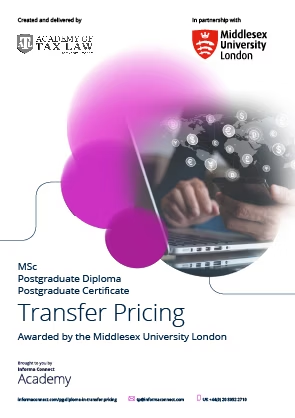POSTGRADUATE DIPLOMA IN TRANSFER PRICING
PG-Dip (Stage 2) builds on Stage 1, deepening Transfer Pricing methods for controlled transactions. Learners conduct comparability analyses and determine arm’s length charges for intra-group services. The module covers mechanics, application, and calculations for each method, alongside OECD-aligned documentation. It also addresses BEPS action points, risk management, and dispute resolution, equipping participants to apply methods rigorously and defend positions under audit.
Duration
12 months, part-time
Credits
12 University Credits
Effort
6–10 hrs/week average*
*Student dependent
Assessment
4x Module Assessments
Format
Online – Recorded lectures, Prescribed Reading, Live Q&As
Award
University

PG-Diploma (Stage 1+2) Overview
Exit Qualification: Postgraduate Diploma, or progress to Stage 3 for MSc (Master’s)

This award consists of 2 Stages. For the Postgraduate Diploma award Stage 1 & Stage 2 must be completed, consisting of 120 credits in total.
- Each stage contains two modules:
- Stage 1 – TP Legal Framework & TP Methods and Compliance, with 30 credits awarded per module.
- Stage 2 (detailed on this page) – Sharing Corporate Resources & Specialised Areas, with 30 credits awarded per module.
- The learning will address important issues within the sector, drawing on key points, to ensure you gain a thorough understanding of the topics.
- Students must complete and successfully pass the assigned coursework assessments and the final exam at the end of each stage to claim their award.
- Pre-recorded academic lectures will be released each week, accompanied with the prescribed reading, any additional reading and/or research, as required. Directed reading will relate to provided case law, and will also include reading from legislation, books, articles, academic and professional journals.
- The learning from the lectures will be emphasised with an array of case studies, practice examples and resources, to challenge thinking in a practical context. Engaging activities on the discussion forum, the use of quizzes, polls and other forum built-in activity will further validate the learning objectives.
- Each main topic will end with a live-online tutorial, conducted by the lecturers. The tutorials are designed to be interactive, providing students with the opportunity to ask questions and to consider issues from different perspectives.
This module builds on Stage 1 and deepens your knowledge. It develops a thorough understanding of comparability analysis after accurate delineation of the transaction, and shows how to determine any adjustments needed to reach an arm’s length result.
We cover intra-group services, when a service is considered rendered, how to determine an arm’s length charge, and how to apply the OECD Guidelines, including the regime for low value-adding services.
We then address more complex transfer pricing transactions, focusing on how to identify, analyse, and price them in line with the OECD Guidelines.
Finally, we tackle intangibles, including identifying the relevant intangible and its legal and economic owner, pricing transactions and transfers involving intangibles, and allocating returns in accordance with the OECD Guidelines and the arm’s length principle.
Learning Outcomes
On successfully completing this module, the student will be able to:
Course Content
- Perform an appropriate comparability analysis once a transaction has been delineated and carry out the required adjustments.
- Apply the comparability factors to each of the nine steps in a comparability analysis.
- Determine Transfer Pricing on Intra-Group Services as per the OECD guidelines.
- Verify the arm’s length charge for intra-group services and low value-adding intra-group services.
- Analyse intangible transactions to apply the arm’s length principle to such transactions and implement any adjustments to these intangible transactions to adhere to the OECD guidelines for intangible transactions.
Knowledge (understanding)
- Critically analyse the nine steps of a comparability analysis.
- Evaluate the use of comparables in a comparability analysis.
- Interpret OECD transfer pricing guidelines surrounding the charging for intra-group services.
- Identify which intra-group services can be classified as low-value-adding intra-group services.
- Identify intangible transactions for transfer pricing purposes as per the OECD Guidelines.
Skills (competencies)
- Perform an appropriate comparability analysis once a transaction has been delineated and carry out the required adjustments.
- Apply the comparability factors to each of the nine steps in a comparability analysis.
- Determine Transfer Pricing on Intra-Group Services as per the OECD guidelines.
- Verify the arm’s length charge for intra-group services and low value-adding intra-group services.
- Analyse intangible transactions to apply the arm’s length principle to such transactions and implement any adjustments to these intangible transactions to adhere to the OECD guidelines for intangible transactions.
This module develops a detailed understanding of cost contribution arrangements, including how to apply the arm’s length principle and make appropriate adjustments.
It builds competence in pricing financial transactions in a transfer pricing context, including cash pooling, on an arm’s length basis.
Students learn to identify, analyse, and price complex transactions under the OECD Guidelines, with a focus on business restructurings and permanent establishments. The module clarifies what constitutes a business restructuring and how the arm’s length principle applies in those circumstances.
Finally, it explains the arm’s length principle in depth alongside Articles 5 and 7 of the OECD Model Tax Convention, and sets out the principles for attributing profits.
Learning Outcomes
On successfully completing this module, the student will be able to:
Course Content
Identify and select the most appropriate Transfer Pricing method to establish the arm’s length price or profits between associated enterprises.
Identify possible risks and controversies and apply an ethical solution to manage these risks and controversies.
Resolve international tax disputes through dispute resolution mechanisms such as the Mutual Agreement Procedure and the Advance Transfer Pricing Agreement.
Knowledge (understanding)
- Critically analyse the nine steps of a comparability analysis.
- Evaluate the use of comparables in a comparability analysis.
- Interpret OECD transfer pricing guidelines surrounding the charging for intra-group services.
- Identify which intra-group services can be classified as low-value-addinglow value-adding intra-group services.
- Identify and evaluate transfer pricing aspects of business restructurings.
- Justify the applicability of the arm’s length principle for business restructuring transactions.
- Interpret tax treaty definitions of what constitutes a permanent establishment as set out in the OECD Model Tax Convention.
Skills (competencies)
- Evaluate an appropriate comparability analysis once a transaction has been delineated and carry out the required comparability adjustments.
- Apply the comparability factors to each of the nine steps in a comparability analysis.
- Determine Transfer Pricing on Intra-Group Services as per the OECD guidelines.
- Verify the arm’s length charge for intra-group services and low value-adding intra-group services.
- Execute the appropriate adjustments needed during a business restructuring to ensure the transaction is at an arm’s length price.
- Calculate the arm’s length principle applicable to business restructuring transactions.
- Apply the principles of the OECD Model Tax Convention on permanent establishments to determine whether a non-resident enterprise must pay income tax in another state.

The assessment scheme consists of the following, (per module):
- Coursework Assessment 1 (20 Marks)
- Coursework Assessment 2 (20 marks)
- Final Assignment (60 Marks)
- Total – 100 Marks
To qualify for the Postgraduate Diploma (or progress to Stage 3) the candidate must complete both modules, including both modules from Stage 1.
Download Course Brochure
PG-Cert | PG-Dip | MSc

